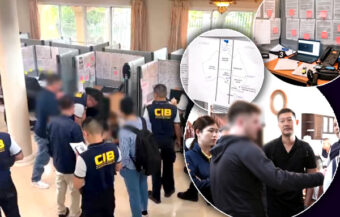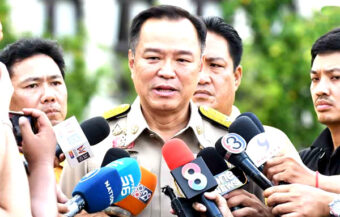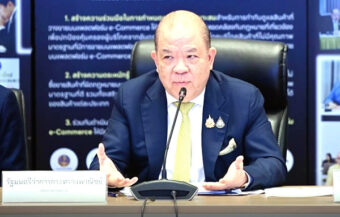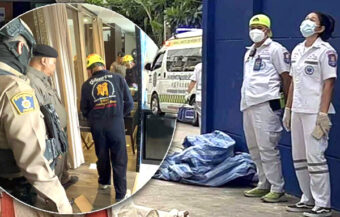Thailand’s visa waiver scheme faces mounting scrutiny as a series of crimes involving Chinese nationals, including abductions and scams, spark a crisis of confidence among tourists. Prime Minister Paetongtarn Shinawatra addresses growing security concerns.
On Friday, Prime Minister Paetongtarn Shinawatra told reporters that she ordered the Digital Economy and Society Ministry to monitor media reports on Thailand circulating within the Chinese social media sphere. At length, the country is facing a crisis of confidence in the Chinese market. The situation is placing Thailand’s visa waiver scheme, initiated by the Pheu Thai-led government in early 2024, under the microscope. This comes after a spate of cases linked with Chinese nationals, most notably the abduction of a Chinese actor and model by a scammer organization in Myanmar. One 31-year-old, Wang Xiang, was rescued by Thai forces this week after an intervention by Ms. Paetongtarn.

The appearance of the gaunt-looking victim with a shaved head did little to assuage Chinese views, particularly after two more cases emerged, in particular, the case of Yang Zeqi, who is still in captivity.
At the same time, the debacle has focused attention on Thailand’s permanent visa waiver scheme with China. It now appears that this concession, far from boosting tourism numbers, is presently undermining confidence.
She was responding to a growing China crisis of confidence. In short, a series of events has again stirred up consumer unease in Thailand’s largest foreign tourism market.
Growing China crisis raises questions over Thailand’s visa waiver scheme and confidence in tourism
It comes in a week when a young Chinese actor was recovered from inside Myanmar. Thirty-one-year-old Wang Xiang, a relatively unknown Chinese actor, went missing only last Friday. The Chinese actor was reportedly duped into coming to Thailand by baiting him with a high-paying offer using the name of a well-known entertainment company in Bangkok.
At length, however, he was whisked to Tak’s Mae Sot district and taken across the border. After that, he found himself in the clutches of a scammer gang. Mr. Wang became a human trafficking victim.
However, his girlfriend decided not to accept his fate. She took to the media in China. “We have no choice but to borrow the power of the internet to amplify our voices,” she wrote on Weibo on Sunday, January 5th. Following this, her boyfriend’s plight soon touched the heart of Ms. Paetongtarn.
Consequently, by some miraculous intervention, the Royal Thai Police were able to extract Mr. Wang from Myanmar.
He was whisked by a Royal Thai Police jet to Bangkok, where he was debriefed. However, the sight of the Chinese actor, newly rescued with his shaved head, did not exactly reassure Chinese audiences.
Assassination of Cambodian-French MP and further Chinese nationals’ disappearances highlight problems
Then came news in Bangkok that a former Cambodian-French MP had been assassinated by a hitman after stepping off a tourist bus. The 74-year-old man was gunned down in front of his French wife.
A prompt response by the Royal Thai Police identified the culprit. However, he appears to have crossed the border into Cambodia. Afterwards, despite being reportedly pursued and arrested by Thai police in Battambang, he was taken by Cambodian security services to Phnom Penh.
That incident is certainly not done with. French authorities and media have begun clamouring for answers. In truth, there are deeply held suspicions that Cambodian strongman and dictator Hun Sen was behind the callous murder.
Further disaster struck when another Chinese entertainment figure was reported as having been captured in Myanmar.
This man was not so fortunate. However, his story is nearly identical to that of Mr. Wang Xiang. Therefore, it is not unreasonable that Chinese people are asking if this is a trend or a pattern.
Missing Chinese model Yang Zeqi’s journey raises questions about Thailand’s visa-free scheme
Yang Zeqi was reported as having been missing since December 2nd, 2024. At length, he flew to Thailand, taking advantage of its visa-free facility, at 6:16 am the same day.
He flew from Beijing’s Daxing Airport to Suvarnabhumi Airport. Following his arrival, he took a car from Bangkok’s main airport. Just like Wang Xiang, he was subsequently transferred to a second vehicle and brought to the border.
Afterwards, by 2 pm on December 2nd, he went missing near the Thai-Myanmar border.
Days later, he posted a muted message suggesting he was lonely. Then, a full eight days later, he made a video call to his mother. The male model was wearing black. At the same time, he appeared subdued and unhappy. Significantly, his mother noticed an injury at the corner of his eye.
After that, all contact with the young man ceased.
In addition, there are reports of another Chinese national missing. In short, a 21-year-old Chinese woman identified as Ms. Wu Jiaqi. It is reported that her father, Mr. Wu Weidong, sought the help of Thailand National Police Chief General Kittirat Phanphet.
Later, it was reported that police were studying CCTV and other imagery to trace the woman’s activities after she landed at Suvarnabhumi Airport.
Cryptocurrency thefts, scams and increasing Chinese criminal activity, driving concerns about Thailand
Following these reports, on Thursday news emerged of two cryptocurrency thefts totaling ฿13 million in Bangkok. Again, the victims were Chinese, with the perpetrators either being Chinese or posing as such.
Nonetheless, Thai police on Thursday managed to track down both gangs. In addition, they also recovered the ฿13 million in cash paid over.
On Thursday, Ms. Paetongtarn insisted that Thailand was safe for tourists. Indeed, the PM said she had given instructions to the Digital Economy and Society Ministry to begin monitoring reporting. She also called for understanding and cooperation in getting the government’s message across.
“Most of them are rumours, not true. And this has been released for a while to destroy Thailand’s image. So I ask our fellow citizens to cooperate. If we have connections with China or have Chinese friends, we must help communicate with each other. And the government is looking into this issue and cannot remain indifferent,” the PM exclaimed.
Ms. Paetongtarn did not clarify which reports were true or not true.
Thailand’s Visa Waiver scheme facing mounting scrutiny as Chinese tourists reconsider or cancel trips
However, it is clear that there is a problem. Certainly, the permanent visa-free waiver between Thailand and China appears to be a double loss for the kingdom. Not only has it meant more Thais visiting China, but it is a significant contributor to the problems presently being experienced.
In short, it may be partly responsible for the fall-off in Chinese numbers that was even seen prior to the end of 2024. Certainly, now it appears Thailand is going to take a hit.
The negative publicity on Chinese social media platforms has been virulent against holidaying or visiting Thailand. For instance, the site “Xiaohongshu,” or “Little Red Book,” saw 380,000 posts among users trying to cancel trips to Thailand.
An example was Ms. Shawna Li, a Chinese woman who planned to travel with three female friends. Ms. Shawna had booked to be in Thailand from January 28 to February 4th.
However, all four friends agreed to cancel their trip. In brief, the consensus was that Thailand was too dangerous.
“We changed our mind because of basic safety concerns, especially since we are four women travelling together,” Ms. Shawna explained. “I’ve never been to Thailand, which people say is affordable and fun. I used to think it might be a bit unsafe, but not to this extent.”
Academic insight suggests policing changes and easier Chinese access contributing to security challenges
In the meantime, a former criminologist and justice administration expert, Professor Thanansak Bowornnantakul of Mahidol University, has put forward some suggestions on what is at the root of the problem.
Firstly, he identifies a movement in Thailand’s policing towards human rights, as seen in developed countries. Certainly, to some extent, this ties the hands of the police in taking more decisive and serious action.
In particular, since Chinese police often use draconian measures and operate in what is an increasingly authoritarian police state, criminals in China are moving to Thailand to carry out exploits. This includes luring murder targets to their deaths, carrying out kidnappings and ransom demands, as well as scams and fraud.
Furthermore, these gangs and criminals have close networks. In particular, they are further aided by lawlessness on Thailand’s borders.
The ability of some of these criminals to escape, for instance, into Cambodia or Myanmar, is a key factor. Of course, many of these operations are orchestrated from Thailand’s troubled borders with Myanmar and Cambodia.
This is certainly borne out by this week’s events.
Professor Thanansak questions the impact of the China visa waiver on the kingdom’s national security
However, Professor Thanansak also appeared to question the easier access of Chinese nationals to Thailand. He suggests that proper authorization and screening under the previous regime protected the kingdom from criminal exploits.
It should be noted that the previous government of General Prayut Chan Ocha had resisted a Chinese visa waiver before the COVID-19 pandemic.
Indeed, in August 2019, the year Thailand hit a record high in both tourism earnings and numbers, then Minister of Foreign Affairs, Don Pramudwinai, particularly shut down even a temporary visa waiver plan proposed at the time.
Foreign Minister comes out strongly against visa waiver proposals for China and India at cabinet
Chinese visa scheme linked to Chinese beggars on Bangkok’s streets as PM accepts its failures
฿13 million swindled and robbed in Chinese criminal exploits in central Bangkok on Thursday afternoon
Government MP and House Chair calls for an urgent review of Thai Chinese visa waiver security resources
Hitman who gunned down former Cambodia MP in Bangkok arrested in Cambodia. Taken to Phnom Penh
In a strongly worded letter to the cabinet, he predicted it would be highly damaging to national security. Furthermore, he suggested that such a move would be injurious to Thailand’s economy in the longer term.
Join the Thai News forum, follow Thai Examiner on Facebook here
Receive all our stories as they come out on Telegram here
Follow Thai Examiner here
Further reading:
Tourism cryptocurrency sandbox payment plan is bound to face stiff opposition from the central bank
Thaksin calls for crypto-based bonds. Notes success and beauty of Isan women who marry foreigners
Future Bank of Thailand Chairman Pick warns that the Thai economy faces ‘disaster’ without rate cuts
Trump’s trifecta triumph means Thailand will be more on edge as he prepares to take power in January


















